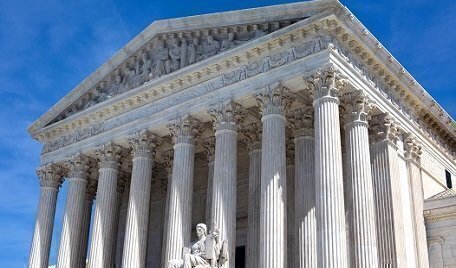The Supreme Court is now on a break from hearing arguments until mid-February. But the last three days of February are shaping up to be action-packed for the nine Justices.
 Arguments actually resume on February 20, with cases involving trial review standards, the Fifth Amendment and other procedural matters that are important, but unlikely to grab headlines.
Arguments actually resume on February 20, with cases involving trial review standards, the Fifth Amendment and other procedural matters that are important, but unlikely to grab headlines.
The following week, five cases in three days will get much more attention, with two of the Court’s major cases up for arguments.
On Monday, February 26, the Court will consider a potential landmark case that could greatly affect public-worker unions. In Janus v. American Federation, the Justices might overrule or greatly alter a decision from the 1977 Burger Court, Abood v. Detroit Board of Education.
At issue is part of the Illinois Public Labor Relations Act, which requires all employees working at a public agency or public organization to pay a fee for unions to negotiate contracts, even if some employees don’t belong to unions. The Abood decision rejected a constitutional challenge to agency fees. In March 2016, an evenly divided Court couldn’t decide a direct challenge to Abood itself, Friedrichs v. California Teachers Association. Petitioners in the Janus case want to the Supreme Court to settle if public sector agency fee arrangements are unconstitutional under the First Amendment.
The other case on February 26 is Ohio v. American Express, which is about the ability of American Express to dissuade vendors from telling customers about other card services that have lower merchant fees. Ohio contends this so-called “anti-steering” practice violates anti-trust laws.
Then on Tuesday, February 27, the Court gets another big case, United States v. Microsoft. The digital privacy fight involves the right of Microsoft to exclude emails hosted on overseas servers from government subpoenas. Back in 2013, federal investigators successfully got warrants from a court to obtain emails located on a server in Ireland as part of a drug investigation. Microsoft believes the warrants violated the terms of the Stored Communications Act of 1986 and only Congress can provide those warrant powers by amending the act.
The other case that Tuesday is one of the more unique ones at the Court this term, Lozman v. City of Riviera Beach. Fane Lozman is no stranger to the Court; back in January 2013, Lozman prevailed in a 7-2 decision at the Supreme Court in his appeal about his former floating home, which had been seized by Riviera Beach, Florida, and destroyed under the terms of admiralty law. Now, Lozman is back fighting a case about his arrest at Riviera Beach council meeting at a public comment session. Lozman was arrested after he refused to leave the session and walk outside of the room.
And on Wednesday, February 28, the Court will hear an appeal about the ability voters to wear clothing or campaign buttons at a polling place that endorse a political cause. In Minnesota Voters Alliance v. Mansky, the Minnesota law in question prevents voters from wearing political badges, political buttons, or other “political insignia” at polling places, because the messages are “designed to influence and impact voting” or promote a “group with recognizable political views.” Andrew Cilek of Hennepin County was temporarily stopped from voting because he was wearing a t-shirt with a “Don’t Tread on Me” and a Tea Party slogan, and a button endorsing Voter ID policies from a group called Election Integrity Watch. The Voters Alliance believes the law is a broad ban on political speech at the polls conflicts with the First Amendment.
Scott Bomboy is the editor in chief of the National Constitution Center.







